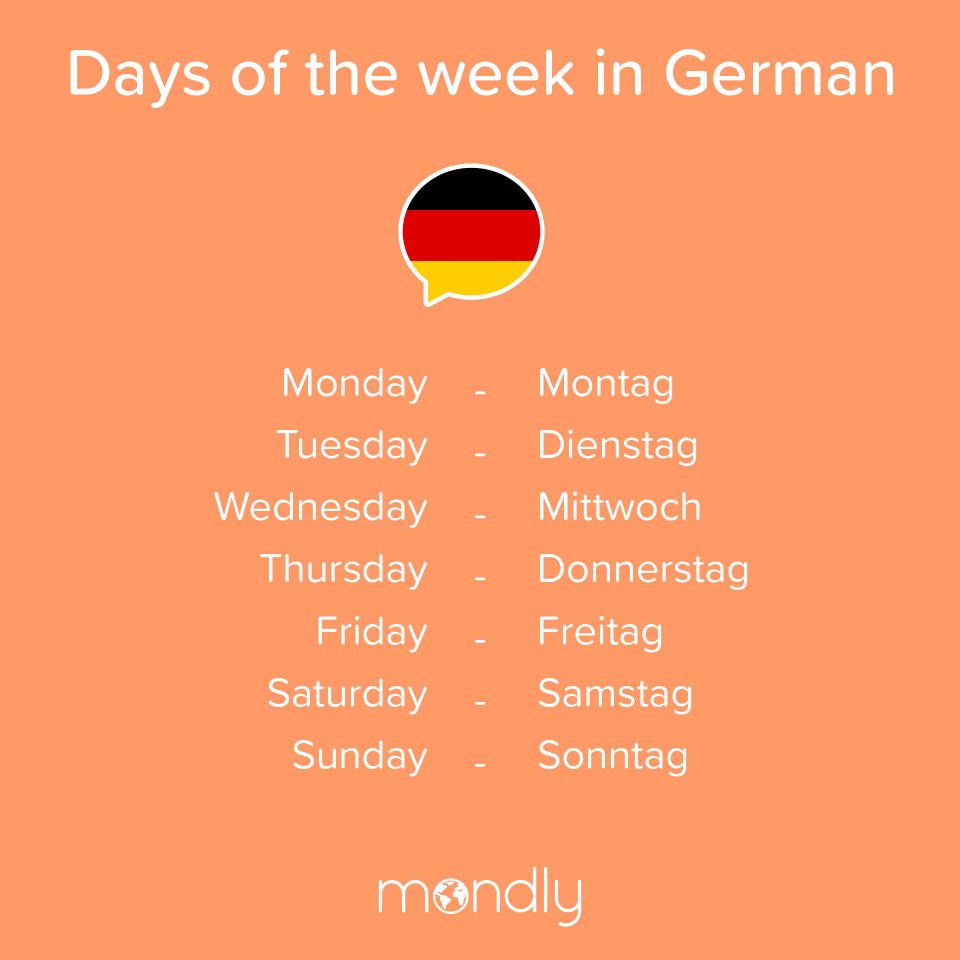
Wochenstruktur in Deutsch Verstehen

Wochenstruktur in Deutsch Verstehen
If someone asks_welchen Wochentag haben wir heute?_ (“which day of the week do we have today?”), what do you answer? The days of the week are probably one of the first things you learn not just in German but in any language. As a toddler, you probably started with “mom”, “dad”, “hello”, and “thank you”, then you probably advanced to counting, colors, and, naturally, the days of the week. So, if you are on your way to learning German , the days of the week in German are surely a good starting point.
If you think about it, the_Tage_ (days) of the_Woche_ (week) is one of the most basic and important language lessons. Simply knowing these seven short words will help you set up meetings, and dates and create a weekly agenda that will decide your every social and professional move. After all, our entire life revolves around the concept of time and the many ways we keep track of it: seconds, minutes, hours, days, weeks, months, years, and so on. So let’s help you get started and see which are the weekdays in German.
The days of the week in German
To go straight to the point, the days of the week in German are:
- Monday – Montag
- Tuesday – Dienstag
- Wednesday – Mittwoch
- Thursday – Donnerstag
- Friday – Freitag
- Saturday – Samstag
- Sunday – Sonntag
Every German weekday (except, of course, Wednesday or_Mittwoch_) ends with_tag_ which you already know from_Guten Tag_ that it means “day”.
To make German weekdays even easier to remember, let’s get into a little etymology. For example,Montag which is“Monday” in German comes from the German word_Mond_ (“moon”). So Monday in German is literally “moon-day”.
Dienstag (“Tuesday”) on the other hand has connections to the old Germanic god Týr which was the god concerned with the formalities of war (especially treaties) and also of justice. Dienstag was considered Týr’s day which sounds like “Tuesday” because this is actually where “Tuesday” comes from as well. As you already know, English is a Germanic language so there are many similarities between modern-day German and English.
Mittwoch , the only German weekday that doesn’t end in_tag_ , simply means “midweek”.

The days of the week in German
“Thursday” which is_Donnerstag_ in German literally means “thunder’s day”. The day was originally named after Thor, the super awesome Norse god Marvel made famous. In German-speaking cultures, Thor was known as Donar so this is where_Donnerstag_ comes from. Obviously, the English word “Thursday” comes from “Thor’s day”.
Both_Freitag_ and“Friday” are connected to the goddess Frige (or Frigg in Norse). She was the goddess of motherhood and marriage and her name comes from the verb “fríja” = “to love”.
Saturday is**Samstag** in German (or_Sonnabend_ “sun-evening” in some parts of northern and western Germany).Samstag originates from the Greek_sambaton_ or older_sabbaton_ which is related to “Sabbath”.
Sonntag (“Sunday”) comes from the German word Sonne (“sun”). So_Sonntag_ and “Sunday” are both literally “the day of the sun” or “sun-day”.
As you can see, the German days of the week are very similar to English, so you shouldn’t have a hard time remembering them. But, if you do, you can always get Mondly , the award-winning language learning app that brings together crystal clear audios recorded by fluent voice actors, real conversations, and practical topics to make German easy to learn .
How to use the German days of the week correctly
If you want to get things even further, here are some basic rules to make sure you’ll use the German days of the week correctly in any situation.
as opposed to some places where Sunday is considered to be the first day of the week, in German-speaking countries,Montag (“Monday”) is considered to be the first;
the German days of the week are usually capitalized, but there is also one situation when they are not. When you want to express that something is happening weekly on that particular day, you don’t capitalize but add an “s” to express the plural:Ich gehe dienstags in die Klasse (“I go to class on Tuesdays”);
the days of the week are all masculine in German. This means they’ll use the masculine articles der (the) and ein (a);
use am (“on”) to say that something is happening on a particular day – am Montag (“on Monday”);
use “von … bis …” to say “from … to …”. For example Von Mittwoch bis Freitag, bin ich in Paris (“From Wednesday to Friday, I am in Paris”).
Speak German fluently in just 10 minutes a day
Do you want to see the German weekdays in action in real conversations? Get Mondly, the award-winning language learning app that will help you speak German as if you were born in Berlin.
It can be tricky to master German pronunciation if you don’t actively live in Germany. But with Mondly, you’ll have access to a unique, fast and highly efficient learning method that allows you to learn German naturally with practical topics, authentic conversations and bite-sized Daily Lessons.
Start using Mondly for free on your computer or download the app and learn German fast anytime, anywhere.
Also read:
- [New] In 2024, Unleash Your Gameplay's Social Impact From Xbox Live to Facebook
- [Updated] 2024 Approved Guide to Skype Call Audio & Video Capture Windows/OS X
- [Updated] In 2024, Unboxing the Year in Tweet Videos - Complete '23 Package
- 10 Minutes, Master Bulgaria Today
- 153+ Useful Russian Words & Phrases for Safe Travels
- 2024 Approved Boost Your Visual Language with Premium Affects Extensions
- Discovering Worldwide Loving Sentiments Today
- Expo LingoFutura: Crafting the Linguists of Tomorrow
- Forever Free - Mondly’s Lifetime Access Plan
- How to Fake Snapchat Location on Vivo Y200e 5G | Dr.fone
- In 2024, All-Inclusive Rundown What's Behind the Google Podcast App?
- Mondly Unveils: Revolutionary VR Language Learning Experience
- Perfect Pronunciation in Russian Phonetics
- Ready for a New Era in Communication with AI
- Staying One Step Ahead: How Apple Is Fortifying iMessage Defenses for Tomorrow's Challenges, Featured on ZDNet
- Unova Stone Pokémon Go Evolution List and How Catch Them For Vivo Y27s | Dr.fone
- Updated In 2024, Step-by-Step Adding and Eliminating Audacity From Chromebooks
- Title: Wochenstruktur in Deutsch Verstehen
- Author: Christopher
- Created at : 2025-02-24 18:27:59
- Updated at : 2025-02-28 19:13:08
- Link: https://mondly-stories.techidaily.com/wochenstruktur-in-deutsch-verstehen/
- License: This work is licensed under CC BY-NC-SA 4.0.